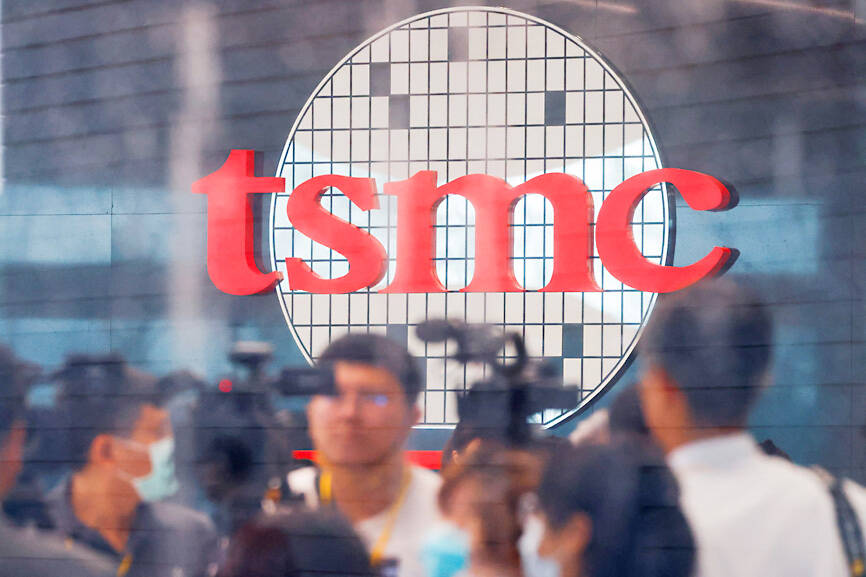Taiwanese companies have been scaling back their investments in China so far this year to just 11 percent of the nation’s total outbound direct investment, the lowest share in decades and well below their heavy spending in the US and Germany, the Nikkei Asia reported yesterday.
During the first 11 months of this year, Taiwan’s approved outbound investment soared 87 percent annually to US$25.7 billion, while investment in China plummeted 34 percent year-on-year to US$2.96 billion, about 11 percent of the total, statistics released by the Ministry of Economic Affairs on Wednesday last week showed.
China had been the biggest investment destination for Taiwanese companies, but things changed at the beginning of this year, the ministry said.

Photo: Ann Wang, Reuters
With China-bound investment in decline, China for the first time was replaced by France and dropped to the second-largest outbound investment destination in February.
The decline in China-bound investment extended to the first 11 months of this year.
The Nikkei Asia attributed the drop-off to China’s economic doldrums, as well as the influence of the long-standing and mounting tensions between the two sides.
Taiwanese companies are also finding it harder to conduct business in China amid trade friction between Washington and Beijing that has led to US duties on Chinese goods, the report said.
Taiwanese spending in China has plummeted from a peak of 84 percent in 2010, when Taiwan and China signed the Economic Cooperation Framework Agreement, but even from last year, when China still accounted for 34 percent of outbound investment, the report said.
This year’s total is expected to clock in at less than half of the 30-year low of 28 percent in 1999, it said.
Meanwhile, investment in Europe and the US has skyrocketed.
Taiwanese foreign direct investment in the US surged ninefold in the first 11 months of this year to US$9.64 billion, making up 37 percent of the total, the report said, citing the ministry’s statistics.
Spending in Germany alone soared past the China figure, ballooning 25-fold to US$3.9 billion, driven by Taiwan Semiconductor Manufacturing Co’s (台積電) investment in a new fab in Dresden, it said.
With China’s economy still stagnating and the Washington-Beijing technology dispute unresolved, Taiwan’s spending in China looks unlikely to bounce back any time soon, the report said.
“Taiwanese investment in China continuing to decline will be the main scenario as long as US-China tensions continue,” Sun Ming-te (孫明德) of the Taiwan Institute of Economic Research (台經院) said.

‘DANGEROUS GAME’: Legislative Yuan budget cuts have already become a point of discussion for Democrats and Republicans in Washington, Elbridge Colby said Taiwan’s fall to China “would be a disaster for American interests” and Taipei must raise defense spending to deter Beijing, US President Donald Trump’s pick to lead Pentagon policy, Elbridge Colby, said on Tuesday during his US Senate confirmation hearing. The nominee for US undersecretary of defense for policy told the Armed Services Committee that Washington needs to motivate Taiwan to avoid a conflict with China and that he is “profoundly disturbed” about its perceived reluctance to raise defense spending closer to 10 percent of GDP. Colby, a China hawk who also served in the Pentagon in Trump’s first team,

SEPARATE: The MAC rebutted Beijing’s claim that Taiwan is China’s province, asserting that UN Resolution 2758 neither mentions Taiwan nor grants the PRC authority over it The “status quo” of democratic Taiwan and autocratic China not belonging to each other has long been recognized by the international community, the Mainland Affairs Council (MAC) said yesterday in its rebuttal of Beijing’s claim that Taiwan can only be represented in the UN as “Taiwan, Province of China.” Chinese Minister of Foreign Affairs Wang Yi (王毅) yesterday at a news conference of the third session at the 14th National People’s Congress said that Taiwan can only be referred to as “Taiwan, Province of China” at the UN. Taiwan is an inseparable part of Chinese territory, which is not only history but

CROSSED A LINE: While entertainers working in China have made pro-China statements before, this time it seriously affected the nation’s security and interests, a source said The Mainland Affairs Council (MAC) late on Saturday night condemned the comments of Taiwanese entertainers who reposted Chinese statements denigrating Taiwan’s sovereignty. The nation’s cross-strait affairs authority issued the statement after several Taiwanese entertainers, including Patty Hou (侯佩岑), Ouyang Nana (歐陽娜娜) and Michelle Chen (陳妍希), on Friday and Saturday shared on their respective Sina Weibo (微博) accounts a post by state broadcaster China Central Television. The post showed an image of a map of Taiwan along with the five stars of the Chinese flag, and the message: “Taiwan is never a country. It never was and never will be.” The post followed remarks

INVESTMENT WATCH: The US activity would not affect the firm’s investment in Taiwan, where 11 production lines would likely be completed this year, C.C. Wei said Investments by Taiwan Semiconductor Manufacturing Co (TSMC, 台積電) in the US should not be a cause for concern, but rather seen as the moment that the company and Taiwan stepped into the global spotlight, President William Lai (賴清德) told a news conference at the Presidential Office in Taipei yesterday alongside TSMC chairman and chief executive officer C.C. Wei (魏哲家). Wei and US President Donald Trump in Washington on Monday announced plans to invest US$100 billion in the US to build three advanced foundries, two packaging plants, and a research and development center, after Trump threatened to slap tariffs on chips made